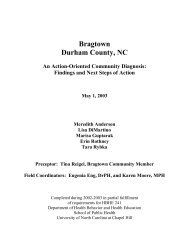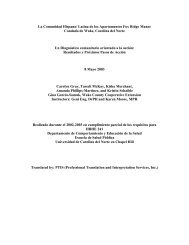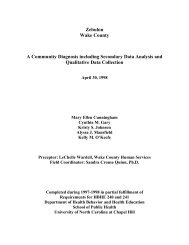The Health bulletin [serial] - University of North Carolina at Chapel Hill
The Health bulletin [serial] - University of North Carolina at Chapel Hill
The Health bulletin [serial] - University of North Carolina at Chapel Hill
Create successful ePaper yourself
Turn your PDF publications into a flip-book with our unique Google optimized e-Paper software.
—<br />
18 <strong>The</strong> <strong>Health</strong> Bulletin October, 1927<br />
up with enough inn<strong>at</strong>e ability to meet<br />
all the demands <strong>of</strong> a simple community<br />
life. But for the diflicult and intric<strong>at</strong>e<br />
tasks <strong>of</strong> adjustment in modern life it<br />
is necessary to supplement with a<br />
formal training wh<strong>at</strong> the child gets<br />
from informal associ<strong>at</strong>ion with his fellows.<br />
It is here th<strong>at</strong> we <strong>of</strong>ten go wrong<br />
and by unwise management complic<strong>at</strong>e<br />
our jobs still more. <strong>The</strong> training process<br />
thus becomes an altern<strong>at</strong>ion <strong>of</strong><br />
helps and hindrances. <strong>The</strong>re is probalthj<br />
no more important consider<strong>at</strong>ion in<br />
child training than the fact th<strong>at</strong> we<br />
fail to distinguish heticeen ich<strong>at</strong> is<br />
good for the child and wh<strong>at</strong> is comfortable<br />
for us. All methods resulting<br />
in "spoiled children" can ie referred<br />
hack to this selfish motive. An <strong>at</strong>tempt<br />
is here made to point out some specific<br />
types <strong>of</strong> misguided effort in child rearing<br />
and in dealing with childhood<br />
problems.<br />
Dictum 1<br />
When we protect a child from all<br />
^inpleasant e-rperience or do anything<br />
for him th<strong>at</strong> he can safely do for himself<br />
we hinder his development.<br />
Why Experience is the food upon<br />
which i)ersonalities thrive. Good or constructive<br />
experience is as necessary for<br />
the proper growth <strong>of</strong> a personality as<br />
good food is for a well-developed body.<br />
Such exi>erience is sometimes denied<br />
the child because we think it is unpleasant<br />
for him. Almost every change<br />
<strong>of</strong> habit is unpleasant yet we must<br />
realize th<strong>at</strong> good personality development<br />
is a process <strong>of</strong> forming useful<br />
habits in the beginning or changing useless<br />
habits to useful ones l<strong>at</strong>er on. Experiences<br />
considered constructive are<br />
<strong>of</strong>ten quite the opposite, they may be<br />
beyond hiy ability, or they are so involved<br />
or complic<strong>at</strong>ed th<strong>at</strong> the child<br />
gets nowhere.<br />
Example : John was five years old<br />
and wanted a scooter but he was given<br />
an electric train instead. He could<br />
play with it when supervised and then<br />
his Dad did most <strong>of</strong> the playing. John<br />
knew how to make the scooter go himself<br />
but he soon lost interest in the<br />
train because after his f<strong>at</strong>her had<br />
turned on the switch all he could do<br />
was to look on. Wh<strong>at</strong> his parents<br />
thought was useful experience for the<br />
lad was really useless. <strong>The</strong>y tre<strong>at</strong>ed<br />
him similarly when he went to school.<br />
Mother tfiok him there every day till<br />
he reached the fourth grade. His school<br />
m<strong>at</strong>es called him a "sissy." Even then<br />
he could have "proved his stuff" had he<br />
been given a chance, but his mother<br />
was afraid a good fist fight would kill<br />
him so she continued to slaughter his<br />
chances for development instead. When<br />
John was twelve and wanted to go<br />
camping he was not permitted to. "Why<br />
he is a mere child" was the reason<br />
given and he continued to depend on<br />
his mother. At eighteen he was sent to<br />
college with hardly an idea from previous<br />
experience <strong>of</strong> how to meet his<br />
new responsibilities, and as a consequence<br />
he "went wild."<br />
Dictum 2<br />
Whenever in dealing tcith a child's<br />
problems tee apply corrective measures<br />
which ignore or evade the real, basic<br />
trouble, ire hinder his growth.<br />
Why We fail to remove the irrit<strong>at</strong>ing<br />
causes with the n<strong>at</strong>ural effect<br />
they continue to make trouble. We introduce<br />
into the situ<strong>at</strong>ion ways <strong>of</strong><br />
handling it th<strong>at</strong> do not help the child<br />
to understand himself and which would<br />
require him to change his behavior<br />
without understanding why. This irrelevant<br />
discipline only confuses him, and<br />
prevents him from working things out<br />
for himself, and makes things worse.<br />
Such acts on our part tend to distort<br />
his whole behavior and to interfere<br />
with his proper mental development.<br />
It is like finding a button and buying<br />
a suit to m<strong>at</strong>ch it to expect him to<br />
reorganize his whole make-up to fit his<br />
parents' err<strong>at</strong>ic requirements.<br />
Example : When warned not to do<br />
something he should not do John seldom<br />
paid <strong>at</strong>tention to his mother. She<br />
found it necessary one day when company<br />
was coming to give him a quarter<br />
to be good. She bribed him to be good<br />
and it paid him to be bad ! It would<br />
have been more effective and less demoralizing<br />
had she excluded him from<br />
the party until he could be pleasant,<br />
thereby showing him how disagreeable<br />
behavior makes a person disliked. <strong>The</strong>n,<br />
after the party, she could look to herself,<br />
and revise her own tendency to<br />
nag and to make thre<strong>at</strong>s which she<br />
did not intend to carry out. Why did


![The Health bulletin [serial] - University of North Carolina at Chapel Hill](https://img.yumpu.com/33495252/312/500x640/the-health-bulletin-serial-university-of-north-carolina-at-chapel-hill.jpg)




![Bulletin of the North Carolina Board of Health [serial] - University of ...](https://img.yumpu.com/48032016/1/153x260/bulletin-of-the-north-carolina-board-of-health-serial-university-of-.jpg?quality=85)
![The Health bulletin [serial] - University of North Carolina at Chapel Hill](https://img.yumpu.com/47603625/1/169x260/the-health-bulletin-serial-university-of-north-carolina-at-chapel-hill.jpg?quality=85)
![The Health bulletin [serial] - University of North Carolina at Chapel Hill](https://img.yumpu.com/47242858/1/169x260/the-health-bulletin-serial-university-of-north-carolina-at-chapel-hill.jpg?quality=85)
![The Health bulletin [serial] - University of North Carolina at Chapel Hill](https://img.yumpu.com/43204263/1/172x260/the-health-bulletin-serial-university-of-north-carolina-at-chapel-hill.jpg?quality=85)
![The Health bulletin [serial] - University of North Carolina at Chapel Hill](https://img.yumpu.com/41981074/1/163x260/the-health-bulletin-serial-university-of-north-carolina-at-chapel-hill.jpg?quality=85)

![The Health bulletin [serial] - University of North Carolina at Chapel Hill](https://img.yumpu.com/40912928/1/164x260/the-health-bulletin-serial-university-of-north-carolina-at-chapel-hill.jpg?quality=85)

![The Health bulletin [serial] - University of North Carolina at Chapel Hill](https://img.yumpu.com/35643061/1/167x260/the-health-bulletin-serial-university-of-north-carolina-at-chapel-hill.jpg?quality=85)
![Biennial report of the North Carolina State Board of Health [serial]](https://img.yumpu.com/34024350/1/166x260/biennial-report-of-the-north-carolina-state-board-of-health-serial.jpg?quality=85)
